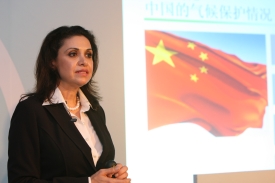Sep 3 2008
Bayer MaterialScience’ startup of its worldscale MDI production facility in Shanghai, and the new BaySystems system house in Guangzhou, will significantly strengthen its foothold in the polyurethane industry in China and in the Asia Pacific region.
 Dr.Azita Owlia speak at PU China press conference
Dr.Azita Owlia speak at PU China press conference
Dr. Azita Owlia, Senior Vice President of Business Unit Polyurethanes, Asia Pacific, noted that demand growth for polyurethanes in China outstripped that in other parts of the world, reflecting the rapid pace of development of downstream industries such as the automotive, construction, and sports & leisure industries. “China is set to become the world’s largest market for polyurethanes by 2015,” says Dr. Owlia. “We are determined to be the supplier of choice for our customers in this market, by being able to supply our materials more efficiently with local production, and to support them with customized solutions through our BaySystems network.”
At the PU China 2008 exhibition in Shanghai, the company is showcasing its new 350 000 tons/year production complex for the manufacture of methylene diphenyl diisocyanate (MDI), which is on track for startup later this year. The highly efficient facility is the largest single-train MDI production in the world, and features the company’s proprietary phosgenation process technology.
A second highlight of the booth illustrates the expansion of the company’s BaySystems network in China. In Q4 this year, the company plans to inaugurate its BaySystems facility in Guangzhou. BaySystems will offer a full range of ready-made and customized polyurethanes solutions, and is well- positioned to support the needs of the rapidly growing industries, such as footwear, furniture, automotive and appliance in South China.
At PU China, Bayer MaterialScience is also showcasing its latest innovations and developments for the polyurethanes industry, including various solutions for tackling climate change.
Providing PU solutions to climate change
Speaking at a press conference in conjunction with PU China, Dr. Owlia emphasized the Bayer Group’s commitment to climate protection, and noted how polyurethane-based solutions can provide a wide range of solutions to today’s climate challenges. “It is possible to calculate the equivalent of carbon dioxide emissions saved throughout the entire lifespan of a product, as a result of using polyurethane-based products and solutions,” Dr. Owlia explains. “By boosting the energy efficiency of buildings or products, or by promoting the use of environmentally-responsible products such as ozone-friendly foaming agents, at Bayer MaterialScience we believe we can contribute greatly to climate protection.”
In construction, BaySystems® rigid foam provides superior insulation properties, thereby requiring less energy consumption in controlling the temperatures within the building. For every kilogram of polyurethane used in construction, as much as 755 kilograms of carbon dioxide equivalent emissions could be saved over the average lifespan of a building, according to Bayer’s estimates. Such rigid foam is already being used in Bayer’s first zero-emission building, the EcoCommercial Building. The building, currently being constructed in India, is expected to derive up to a 70% reduction in energy consumption by using such energy-efficient solutions and the building’s own resources for generating solar energy.
In the transportation industry, a lighter vehicle is a more fuel-efficient vehicle. With Baypreg®F and Multitec®, automotive manufacturers can reduce the weight of a carbody parts by 30–40% compared to reinforced glass fiber alternatives, enabling cars to be significantly more fuel-efficient. Such advanced polyurethane composites replace wood and particle boards in emergency vehicles, trucks, recreational vehicles and boats. Seats made from polyurethanes further contribute to weight reduction, in addition to providing high levels of comfort. Bayer estimates that every kilogram of polyurethane used in the automotive industry will save the equivalent of 6-12 kilograms of carbon dioxide emissions over the entire lifespan of the car.
“Whether it is used in buildings, cars, refrigerators, or in other applications, our polyurethane-based solutions can help us address today’s climate problems, and enable us to achieve a more sustainable future,” notes Dr. Owlia.
Commitment to Corporate Social Responsibility
At the booth, Bayer MaterialScience also showcased its contribution as part of the Bayer Group’s relief efforts following the earthquake which devastated the Sichuan province in May this year.
As part of a project named Bayer Cares, 50 homes, 20 classrooms and a clinic were constructed at a college in Dujiangyan city, using sandwich panels made with Bayer MaterialScience’s polyurethane raw materials. These facilities, which were officially inaugurated during a handover ceremony on September 1, are being used by students and faculty members of the Sichuan Technology and Business College after the school’s premises were severely damaged during the earthquake. The facilities were designed by the engineering arm of the Bayer Group in China, Bayer Technology & Engineering Services, while Bayer Healthcare provided advice and support in the establishment of the health clinic.
For more information on polymer, click here.